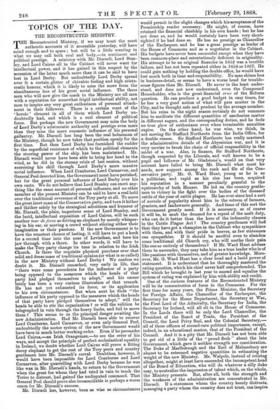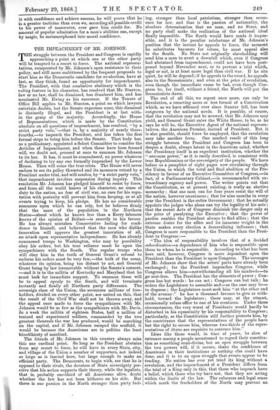TOPICS OF THE DAY.
THE RECONSTRUCTED MINISTRY.
THE Reconstructed Ministry, if we may trust the most authentic accounts of it accessible yesterday, will have mind enough and to spare ; but will be a little wanting in what we may call both soul and body, in sentiment and political prestige. A ministry with Mr. Disraeli, Lord Stan- ley, and Lord Cairns all in the Cabinet will never want for intellectual power, and it has gained in this respect by the accession of the latter much more than it can be said to have lost in Lord Derby. But undoubtedly Lord Derby spread over it a certain glitter of chivalric feeling and high aristo- cratic honour, which it is likely to miss the more from the simultaneous loss of his great social influence. The three men who will now give the mark to the Ministry are all men with a reputation for somewhat frigid intellectual ability, not men to inspire any very great enthusiasm of personal attach- ment in their followers. There is a certain want of the heroic ' element in all of them which Lord Derby un- doubtedly had, and which is a real element of political force. But perhaps the new Government may miss the body of Lord Derby's aristocratic authority and prestige even more than they miss the more romantic influence of his personal gallantry. Mr. Disraeli has long been the real helmsman of the Ministry, though he now takes that position openly for the first time. But then Lord Derby has furnished the rudder by the superficial resistance of which to the political elements the steering power of the ship has been maintained. Mr. Disraeli would never have been able to bring her head to the wind, as he did in the stormy crisis of last session, without exercising his skill through Lord Derby's more massive social influence. When Lord Cranborne, Lord Carnarvon, and General Peel deserted him, the Government must have perished, but for the great personal influence of Lord Derby over his own caste. We do not believe that Lord Stanley can exert any- thing like the same amount of personal influence, and no other member of the present Ministry can be said to have a real hold over the traditional reverence of the Tory party at all. To move the great inert mass of the Conservative party, and turn it hither and thither solely by the strategical adroitness and humour of Mr. Disraeli, the plain, imperious sense of Lord Stanley, and the lucid, intellectual exposition of Lord Cairns, will be such another tour de force as driving an elephant by merely whisper- ing in his ear, or moving a crowd without stirring either their imagination or their passions. If the new Government is to have the remotest chance of lasting, it will have to put a hook for a second time into the nose of Leviathan, and bore his jaw through with a thorn. In other words, it will have to make the Tory party change its tone in relation to the Irish Church. Is there the requisite physical purchase over that solid and dense mass of traditional opinion (or what is so called) in the new Ministry without Lord Derby I We confess we doubt it. Mr. Disraeli remarked, very early in life, that " there were some precedents for the influence of a party being opposed to the measures which the heads of that party had pledged themselves to adopt," and his career lately has been a very curious illustration of that remark. He has not yet exhausted its force, or its application to his own circumstances. But when next he finds "the influence of his party opposed to the measures which the heads of that party have pledged themselves to adopt," will the heads be able to stir the organization or will the volition be telegraphed in vain through the heavy limbs, and fail to move them I This seems to us the principal danger awaiting the new Administration. Had Mr. Disraeli been able to recover Lord Cranborne, Lord Carnarvon, or even only General Peel, undoubtedly the motor system of the new Government would have been in much better working order. Even if he persuades Lord Cairns,—an Irish Orangeman,—to see the error of his ways, and accept the principle of perfect ecclesiastical equality in Ireland, we doubt whether Lord Cairns will prove a fitting decoy elephant to get the rest of the Tory peers and country gentlemen into Mr. Disraeli's corral. Doubtless, however, it would have been impossible for Lord Cranborne and Lord Carnarvon, after quarrelling with Lord Derby because he was like wax in Mr. Disraeli's hands, to return to the Government when the great foe whom they had tried in vain to teach the Tories to distrust, had gained the undisputed command. That General Peel should prove also irreconcilable is perhaps a worse omen for Mr. Disraeli's success.
Mr. Disraeli has, however, been as wise as circumstances would permit in the slight changes which his acceptance of the Premiership render necessary. He might, of course, have retained the financial chiefship in his own hands ; but he has not done so, and he would certainly have been very short- sighted if he had done so. He has no prestige as Chancellor of the Exchequer, and he has a great prestige as leader of the House of Commons and as a negotiator in the Cabinet. His budgets have never been successful except when they have been common-place and ostentatiously deficient in originality. His attempt to be an original financier in 1852 was a terrible failure, and has not been repeated either in 1858 or 1867. He could gain nothing by holding the double office, he would have lost much both in time and responsibility. No man shines less in business-detail, or seems to have a worse head for trouble- some figures than Mr. Disraeli. He never in the least under- stood, and does not now understand, even the Compound Householder, who is the great financial crux of the Reform. question. He can produce a good budget in easy times, for he has a very good notion of what will pass muster in the City, and be thought safe and prudent by the average member. But his reins in the night season certainly do not summon him to meditate the different quantities of saccharine matter in different sugars, and the corresponding duties, and he feels no true glow of enthusiasm even when terminable annuities expire. On the other hand, he was wise, we think, in not moving Sir Stafford Northcote from the India Office, for a double reason. Sir Stafford Northcote has really mastered the administrative details of the Abyssinian war, and it is very unwise to break the chain of official responsibility in the midst of a war. Also, in finance, Sir Stafford Northcote, though respected by the Liberals, and well known to be a. pupil and follower of Mr. Gladstone's, would on that very account have failed to bring Mr. Disraeli what most he needs, new support among the rank and file of the Con- servative party. Mr. G. Ward Hunt, young as he is as a politician, and rapid as his rise has been, acquired his reputation in a manner peculiarly grateful to the squirearchy of both Houses. He led on the country gentle- men to victory in the fight over the bodies of the diseased cattle of the year of cattle plague. He has ever since had a sort of aureole of popularity about him in the esteem of farmers, graziers, and landowners generally. And fame of this sort the Government greatly need. If it is necessary, as of course it will be, to snub the demand for a repeal of the malt duty, who can do it better than the hero of the indemnity clauses in the Cattle Plague Act I The country gentlemen will feel that they have got a champion in the Cabinet who sympathizes with them, and with their pride in beeves, as few statesmen can sympathize. If it should be needful even to abandon some traditional old Church cry, who will soothe their pain like one so entirely of themselves If Mr. Ward Hunt advises them to surrender, they may take him as a true leader who is of like passions with themselves, and of greater knowledge. More- over, Mr. G. Ward Hunt has a clear head and a lucid power of statement. It is understood that he thoroughly mastered the rating question, which his chief never half comprehended. The Bill which he brought in last year to amend and equalize the system of rating was explained by him with ability and credit.
One of the curious features of the Reconstructed Ministry will be its concentration of force in the Commons. For the first time for many years, the Prime Minister, the Secretary for Foreign Affairs, the Chancellor of the Exchequer, the Secretary for the Home Department, the Secretary at War, the First Lord of the Admiralty, the Secretary for India, the Secretary for Ireland, will all sit in the House of Commons. In the Lords there will be only the Lord Chancellor, the President of the Board of Trade, the President of the Council, the Lord Privy Seal, and the Colonial Secretary,— all of these officers of second-rate political importance, except, indeed, in an educational session, that of the President of the Council. And it is a pity that Mr. Disraeli has not been able to get rid of a little of the " proud flesh " about the late Government, which gave it neither strength nor consideration. The Duke of Marlbdrough and the Earl of Malmesbury are almost to be esteemed negative quantities in estimating the weight of the new Ministry. Mr. Walpole, instead of retiring altogether, might at least have succeeded the incompetent head of the Board of Education, who will do whatever a silly duke may, to neutralize the impression of talent which, on the whole, the Ministry presents. But, after all, both the strength and the weakness of the administration are concentrated in Mr. Disraeli. If a statesman whom the country keenly distrusts, managing a party whom the country does not trust, can inspire
it with confidence and achieve success, he will prove that he is a greater tactician than even we, according all possible credit to his power of manoeuvre, ever gave him credit for. No amount of popular admiration for a man's abilities can, except by magic, be metamorphosed into moral confidence.































 Previous page
Previous page